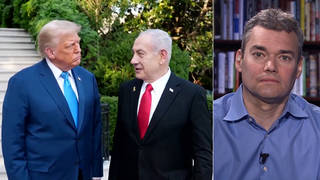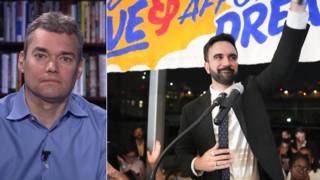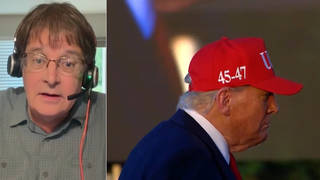
Guests
- Robert McChesneyCo-founder of Free Press. Professor at the University of Illinois at Urbana-Champaign and the author of several books, including his latest, The Political Economy of Media: Enduring Issues, Emerging Dilemmas. He is widely regarded as one of the nation’s foremost media historians.
- Josh SilverExecutive Director of Free Press
Nearly 3,000 people have come from across the nation for what’s become known as the most important gathering of the growing movement for media reform. Participants will hear lectures, take workshops and strategize on efforts to fight media consolidation and democratize the airwaves. Speakers include Dan Rather, Bill Moyers, Arianna Huffington, Van Jones, Naomi Klein and dozens more. [includes rush transcript]
Transcript
AMY GOODMAN: We’re broadcasting from Minneapolis, Minnesota on the convention floor of the National Conference for Media Reform. I’m Amy Goodman. Nearly 3,000 people have come from across the nation for what’s become known as the most important gathering of the growing movement for media reform. Participants will hear lectures, take workshops, strategize on efforts to fight media consolidation and democratize the airwaves. Speakers will include Dan Rather, Bill Moyers, Arianna Huffington, Van Jones, Naomi Klein and dozens more. The media reform group Free Press formed six years ago. This is the fourth National Conference for Media Reform.
We’re beginning our coverage today with the two co-founders of Free Press. Josh Silver is the executive director of Free Press. Robert McChesney is a professor at the University of Illinois, Urbana-Champaign, and author of several books, including his latest, The Political Economy of Media: Enduring Issues, Emerging Dilemmas. He’s widely regarded as one of the nation’s foremost media historians.
We welcome you both to Democracy Now! Josh Silver, let’s begin with you. Talk about the conference.
JOSH SILVER: Well, the conference is an amazing coming together of people from across the country who are really concerned about what’s happening with the media. I mean, we’ve got this problem where we see celebrity fluff, instead of hard news on the news programs on commercial media, sound bite election coverage. It’s all about the horserace analysis. There’s propaganda that we see in these pundits on the air, fake news releases posing as news, the Pentagon spending millions to get seventy-five military analysts who are getting briefed by the Pentagon that you reported on. And people have had it, and they’ve started to realize more and more that there are ways that we can actually fix the system, not just stopping media consolidation, but actually taking control of the future of the internet, which is increasingly going to be delivered through a high-speed internet connection.
A lot of people don’t realize that all of television, radio, phone service, movies are all going to be delivered by high-speed internet. So we have a moment right now in this country where the policies that are going to determine the future of virtually all media are being decided in Washington, and that’s going to be a big topic here this weekend.
AMY GOODMAN: Professor Bob McChesney, you started out, well, being a professor, writing books — your latest, Communication Revolution: Critical Junctures and the Future of Media. How did it turn into this?
ROBERT McCHESNEY: Well, you know, my work was always about, as a scholar: how did we end up with a media system like this? In a democratic society with a wonderful Constitution, with a great tradition of liberty, how did we end up with a media system that does all the stuff Josh was talking about? And it’s done it for a long time, which has denigrated local coverage, which has given us a lot of fluff and hyper-commercialism. How did we end up with a media system controlled by a handful of corporations driven by commercial values?
And when I started researching American history, it became clear this was not intended by the founders. There’s nothing in the Constitution authorizing this. And it’s not a free-market system. It was clear that it was a system set up by the government with direct and indirect subsidies made in the public’s name but without its consent, going back to the foundation of broadcasting, when really powerful interests pushed through the commercial system with very little public support.
And so, when you write research like that, people say, “Well, OK, it doesn’t have to be that way. What do we do now?” The problem is just as severe now. In fact, it’s getting worse. And that leads instantly for a professor to say, “Well, yeah, what do we do now?” And it’s really a wonderful opportunity for a scholar to take their research and have it then be applied and used. And so, I was very privileged to be at a moment in history where my work suddenly became relevant, and I’ve enjoyed it.
AMY GOODMAN: Why do you say “communication revolution”?
ROBERT McCHESNEY: Well, I think one of the reasons why Free Press and the media reform movement exploded in the last five years is that we’re in a unique period historically, one that doesn’t come along all the time, where we have a combination, a confluence, of two crucial events and possibly a third.
The first one is a technological revolution, that was just really changing the business pattern for all media industries. And because of that, a lot of the rules and regulations and the way industries are structured are up in the air, and we’re in a position now — we can change the rules and regulations to make our media system vastly better, or if we don’t do anything, the corporate community will do a good job to make sure it suits their interests in what emerges in the digital era.
Secondly, we’re in a period in which journalism, as we know it, is in freefall. It’s disintegrating. And people are aware of this. It’s not just the content of journalism, the fluff that we talk about, but it’s the actual resources that the corporate community is devoting to journalism. I mean, there’s been a sharp drop-off in the number of working journalists who cover communities in every community in this country. I mean, there are communities of decent size now that barely have any journalism covering them, so if you live in a town, you won’t know what’s going on there anymore. And you also see this in terms of foreign coverage in the United States, where despite the globalization, despite the US role in the world, there are far fewer reporters covering the world for the United States than there were twenty or twenty-five years ago.
This is a deep crisis, and Americans understand that this is not acceptable. So you put those two things together, and people say, “We’ve got to do something about it.” And that’s the basis of this movement.
AMY GOODMAN: There are many more public relations —- people in public relations.
ROBERT McCHESNEY: Well, yeah. There’s no shortage of PR people, no shortage of spin doctors, no shortage of BS artists, but that’s not journalism.
AMY GOODMAN: What about the policies of the current presidential candidates, Barack Obama, John McCain?
ROBERT McCHESNEY: John McCain, to his credit, in the 1990s earned sort of a reputation as being willing to go against dominant corporate lobbies. He voted against the terrible 1996 Telecommunications Act. He was a -—
AMY GOODMAN: The one that President Clinton and Al Gore pushed through?
ROBERT McCHESNEY: That had bipartisan support, absolutely. And he was one of the handful of votes — five votes in the US Senate — that opposed it, along with Russ Feingold and a few others. And he also was in favor of Low Power FM radio, against the powerful commercial broadcasters’ lobby.
AMY GOODMAN: On what grounds did he oppose the Telecommunications Act?
ROBERT McCHESNEY: I think he opposed it on a number of grounds, but I think it was actually — from what we can tell, it was a principled opposition to the corruption of the giveaway to commercial broadcasters of spectrum.
And — but the problem is, if you stop there, he looks great, but his whole record, ironically, given all his talk about earmarks, when you actually study it closely, he’s more in bed with the lobbyists of these commercial broadcasters, and especially AT&T and — the phone company, than almost any senator, because he was the ranking Republican on the Senate Commerce Committee, the relevant committee that works with the FCC, for — has been for the past decade. He’s had numerous opportunities to actually do something meaningful to address the problems he’s given lip service to ten years ago and done nothing. And in fact, instead, what we’ve seen routinely is a willingness to work behind closed doors to advance the interests of powerful commercial interests, especially AT&T, the phone company, but also of commercial broadcasters. So, you know, he’s been a disappointment, and I think that his record is one where the rhetoric does not match up with the reality at all. They’re completely the opposite ends of the spectrum.
Obama is a little less well known. What we do know about Obama is he’s put out extremely thoughtful, comprehensive position papers on the issues. If you go to his website, it’s really striking, the quality of the work. You know, he’s surrounded by — he’s voted the right way in the Senate on virtually every issue that’s come up, unlike McCain, who opposes like keeping the internet open and free, whereas Obama steadfastly supports not letting the phone and cable companies privatize it and select which websites can go through. Obama has voted the right way. He’s got great people around him.
But, you know, the problem — the concern with Obama — I wouldn’t say “problem” — is he’s a centrist Democrat, self-styled. And centrist Democrats, that gets translated into meaning you’re comfortable sort of selling out your voting base for the moneyed interests that bankroll the party. And the test is going to be whether the strong grassroots support for his campaign and the good advisers around him can overwhelm that strong pressure that Democrats traditionally have, if they’re in power, to cave into commercial interest. And so, that’s the battle we would have there.
AMY GOODMAN: Josh Silver, that point of keeping the internet open and free, the difference between McCain and Obama, explain exactly what that means.
JOSH SILVER: It’s an epic battle that’s happening right now, and essentially what it is is the cable and phone companies, they control 98 percent of internet connections in the country, high-speed. They are trying to pass legislation that would allow them to block content, so they can decide which websites move fast and which move slow. This actually really is the question of: will the internet become like cable TV, where they, the phone and cable companies, determine what’s on, how fast it goes and how much it costs? Or will it be open and democratic, the way it is today? This is not a conspiracy theory. Comcast, the cable giant, was just recently caught blocking content of movie downloads that competed with their own products.
AMY GOODMAN: Now, wait. Explain. How did they do that?
JOSH SILVER: They actually were caught stopping their customers, their high-speed internet customers, from receiving downloads of movies with an application called BitTorrent, which not coincidentally is a product that competes with Comcast’s own service of movies.
But what’s really important, getting back to the bigger picture here, it’s millions and millions of people are understanding that these rather technical arcane issues are really about whether or not the American people are going to have access to the facts, whether they’re going to have access to critical journalism that they need to be participants in a democracy. So that’s, I think, why here in Memphis — Memphis, that was our last conference — Minneapolis, we’re seeing —-
AMY GOODMAN: Welcome to Minneapolis, Josh.
JOSH SILVER: —- thousands and thousands of people, and they are really jazzed, and they understand that whatever issue they care about, whether it’s the environment, healthcare, war and peace, if we don’t figure out this media problem and make it better, we are not going to advance any issue that we care about.
AMY GOODMAN: Bill O’Reilly called you guys the craziest of the crazy last night?
JOSH SILVER: He did. Last night on Fox, Bill O’Reilly said that Dan Rather was proving his liberal colors by coming out here and being with the craziest of the crazies, when one of the guests on the show said, “Well, actually, Bill, it’s a conference about media consolidation and the internet.” And he said, “Oh, no. They’re crazy.” So it just shows that, you know, he is a mouthpiece for Rupert Murdoch. He’s a mouthpiece for the largest media corporations. And that kind of omnipotent power that these large networks have, taking control of that and taking that power back from them is what this conference is about.
AMY GOODMAN: And in terms of the corporations that are controlling a lot of — not the overall discussion, because media activists are doing a good job of inserting themselves into it, but the legislation, the writing of the legislation, how do you stop the corporations from writing the laws?
JOSH SILVER: Well, that’s what this is all about. I mean, it’s about getting the public a place at the table when those laws are being made. For the last eighty years, unfortunately, every time a major decision has been made about media in this country, it’s only been the corporations at the table. It’s only been in the last few years that the public has asserted itself at that table. And the only way we’re going to win is if we have millions of people continue to get involved, to raise their voices and to demand better media, because if we don’t, we’re going to lose, and the corporations will seize control of the internet and the future of the media for generations.
AMY GOODMAN: Josh Silver, I want to thank you for joining us, executive director of Free Press. Bob McChesney, you’re staying. We’ll be joined by FCC Commissioner Michael Copps. We will then be talking about the issue of media justice. And finally, the great author Louise Erdrich, she lives here in Minneapolis and owns an independent bookstore called Birchbark Books. Her latest book is The Plague of Doves.












Media Options